Top Rankings
Lansing School District ranks among the top 20% of public school district in Kansas for:
Category
Attribute
Overall Rank
Highest overall rank (Top 20%)
Reading/Language Arts Proficiency
Highest reading/language arts proficiency (Top 20%)
Diversity
Most diverse schools (Top 1%)
Community Size
Largest student body (number of students) (Top 1%)
For the 2025 school year, there are 4 public schools serving 2,511 students in Lansing School District. This district's average testing ranking is 9/10, which is in the top 20% of public schools in Kansas.
Public Schools in Lansing School District have an average math proficiency score of 34% (versus the Kansas public school average of 30%), and reading proficiency score of 42% (versus the 33% statewide average).
Minority enrollment is 30% of the student body (majority Hispanic), which is less than the Kansas public school average of 39% (majority Hispanic).
Overview
This School District
This State (KS)
# Schools
4 Schools
1,340 Schools
# Students
2,511 Students
477,627 Students
# Teachers
158 Teachers
33,417 Teachers
Student : Teacher Ratio
16:1
16:1
District Rank
Lansing School District, which is ranked within the top 30% of all 286 school districts in Kansas (based off of combined math and reading proficiency testing data) for the 2021-2022 school year.
The school district's graduation rate of 88% has decreased from 97% over five school years.
Overall District Rank
#55 out of 286 school districts
(Top 20%)
(Top 20%)
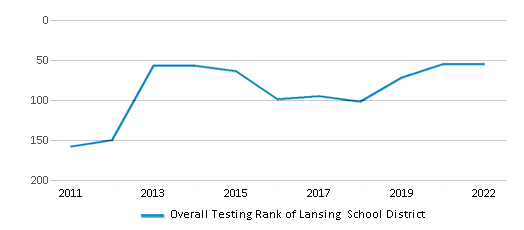
Math Test Scores (% Proficient)
34%
29%
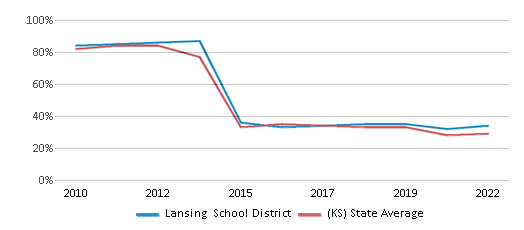
Reading/Language Arts Test Scores (% Proficient)
42%
32%
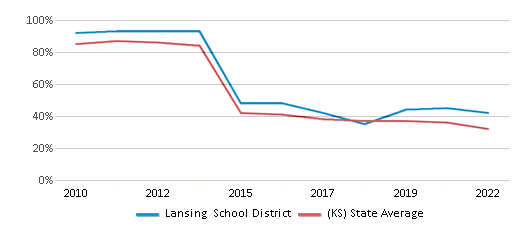
Science Test Scores (% Proficient)
39%
31%
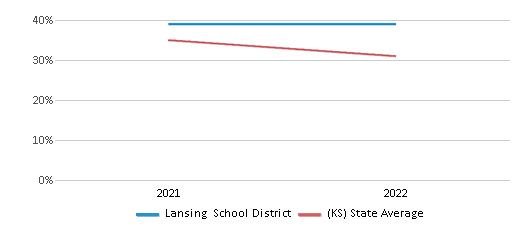
Graduation Rate
88%
89%
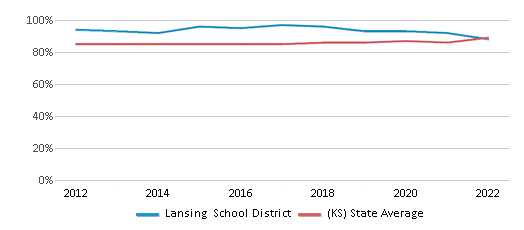
Students by Ethnicity:
Diversity Score
0.49
0.57
# American Indian Students
12 Students
3,553 Students
% American Indian Students
1%
1%
# Asian Students
41 Students
13,530 Students
% Asian Students
2%
3%
# Hispanic Students
310 Students
104,522 Students
% Hispanic Students
12%
22%
# Black Students
149 Students
31,245 Students
% Black Students
6%
7%
# White Students
1,753 Students
293,371 Students
% White Students
70%
61%
# Hawaiian Students
11 Students
1,139 Students
% Hawaiian Students
n/a
n/a
# Two or more races Students
235 Students
30,267 Students
% of Two or more races Students
9%
6%
Students by Grade:
# Students in PK Grade:
66
21,787
# Students in K Grade:
145
31,674
# Students in 1st Grade:
152
32,919
# Students in 2nd Grade:
170
34,119
# Students in 3rd Grade:
162
33,302
# Students in 4th Grade:
197
34,287
# Students in 5th Grade:
140
34,416
# Students in 6th Grade:
202
35,078
# Students in 7th Grade:
188
35,096
# Students in 8th Grade:
213
36,357
# Students in 9th Grade:
247
37,517
# Students in 10th Grade:
183
37,330
# Students in 11th Grade:
218
36,547
# Students in 12th Grade:
228
34,737
# Ungraded Students:
-
2,461
District Revenue and Spending
The revenue/student of $14,489 in this school district is less than the state median of $16,276. The school district revenue/student has stayed relatively flat over four school years.
The school district's spending/student of $13,686 is less than the state median of $17,192. The school district spending/student has stayed relatively flat over four school years.
Total Revenue
$36 MM
$7,774 MM
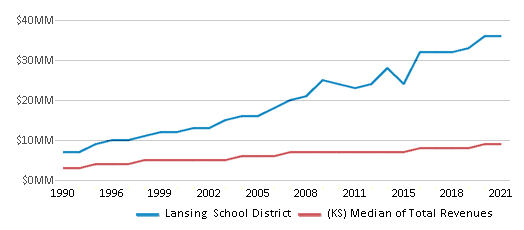
Spending
$34 MM
$8,211 MM
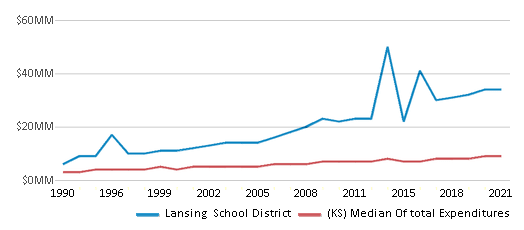
Revenue / Student
$14,489
$16,276
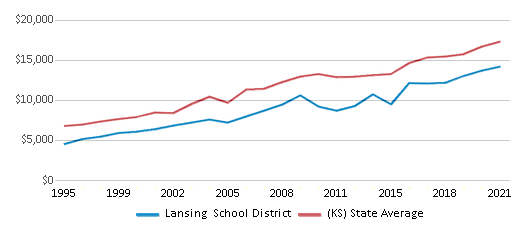
Spending / Student
$13,686
$17,192
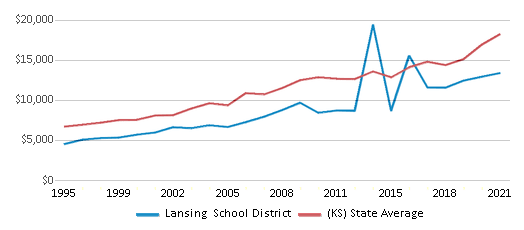
Best Lansing School District Public Schools (2025)
School
(Math and Reading Proficiency)
(Math and Reading Proficiency)
Location
Grades
Students
Rank: #11.
Lansing Intermediate School
(Math: 39% | Reading: 45%)
Rank:
Rank:
8/
Top 30%10
509 W Ida St
Lansing, KS 66043
(913) 297-0990
Lansing, KS 66043
(913) 297-0990
Grades: 4-5
| 337 students
Rank: #22.
Lansing Middle 6-8
(Math: 31% | Reading: 44%)
Rank:
Rank:
7/
Top 50%10
220 Lion Lane
Lansing, KS 66043
(913) 727-1197
Lansing, KS 66043
(913) 727-1197
Grades: 6-8
| 603 students
Rank: #33.
Lansing High 9-12
(Math: 28% | Reading: 43%)
Rank:
Rank:
7/
Top 50%10
1412 147th Street
Lansing, KS 66043
(913) 727-3357
Lansing, KS 66043
(913) 727-3357
Grades: 9-12
| 876 students
Rank: #44.
Lansing Elementary School
(Math: 45-49% | Reading: 25-29%)
Rank:
Rank:
7/
Top 50%10
450 W Mary St.
Lansing, KS 66043
(913) 727-1128
Lansing, KS 66043
(913) 727-1128
Grades: PK-3
| 695 students
Frequently Asked Questions
How many schools belong to Lansing School District?
Lansing School District manages 4 public schools serving 2,511 students.
What is the rank of Lansing School District?
Lansing School District is ranked #58 out of 286 school districts in Kansas (top 30%) based off of combined math and reading proficiency testing data for the 2021-2022 school year. This district ranks in the top 20% of Kansas school districts for: Highest overall rank (Top 20%), Highest reading/language arts proficiency (Top 20%), Most diverse schools (Top 1%) and Largest student body (number of students) (Top 1%)
What is the racial composition of students in Lansing School District?
70% of Lansing School District students are White, 12% of students are Hispanic, 9% of students are Two or more races, 6% of students are Black, 2% of students are Asian, and 1% of students are American Indian.
What is the student/teacher ratio of Lansing School District?
Lansing School District has a student/teacher ratio of 16:1, which is higher than the Kansas state average of 14:1.
What is Lansing School District's spending/student ratio?
The school district's spending/student of $13,686 is less than the state median of $17,192. The school district spending/student has stayed relatively flat over four school years.
Recent Articles

Year-Round Or Traditional Schedule?
Which is more appropriate for your child? A year-round attendance schedule or traditional schedule? We look at the pros and cons.

Why You Should Encourage Your Child to Join a Sports Team
Participating in team sports has a great many benefits for children, there is no doubt. In this article you will learn what those benefits are.

White Students are Now the Minority in U.S. Public Schools
Increasing birth rates among immigrant families from Asia and Central and South America, combined with lower birth rates among white families, means that for the first time in history, public school students in the United States are majority-minority. This shift in demographics poses difficulties for schools as they work to accommodate children of varying language abilities and socio-economic backgrounds.





